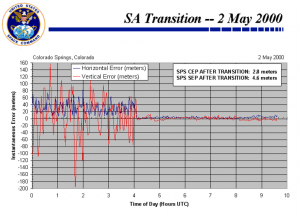If you wish to contribute or participate in the discussions about articles you are invited to contact the Editor
GPS Services
| GPS | |
|---|---|
| Title | GPS Services |
| Author(s) | GMV |
| Level | Basic |
| Year of Publication | 2011 |
GPS provides two different positioning services: the Precise Positioning Service (PPS) and the Standard Positioning Service (SPS).
Precise Positioning Service
As defined by the United States Government the GPS[1] Precise Positioning Service (PPS) is a positioning and timing service provided by way of authorized access to ranging signals broadcast at the GPS L1 and L2 frequencies. The L1 frequency, transmitted by all Navstar satellites, contains a coarse/acquisition (C/A) code ranging signal, with a navigation data message, that is available for peaceful civil, commercial, and scientific use; and a precision (P) code ranging signal with a navigation data message, that is reserved for authorized use. The P-code will normally be cryptographically altered to become the Y-code. The Y-code will not be available to users that do not have valid cryptographic keys. Navstar satellites also transmit a second P- or Y-(P(Y)-) code ranging signal with a navigation data message at the L2 frequency.
In order to restrict civilian user access to full system accuracy, the following protections were introduced:
- S/A or Selective Availability: intentional satellite clock degradation (process-δ) and ephemeris manipulation (process-ε). The effect on horizontal positioning implies going from about 10m (S/A=off) to 100m (S/A=on).[2] The process-δ acts directly over satellite clock fundamental frequency, which has a direct impact on pseudoranges to be calculated by user's receivers. The process-ε consists in truncating information related to the orbits.
USA President Bill Clinton ordered the termination of GPS Selective Availability on May 1st, 2000.[3] In September 2007, this decision was confirmed by the fact that the U.S. Government decided to procure the next generation of GPS satellites, GPS III, without the SA feature. This decision eliminates an important source of uncertainty that generated a considerable corcern amoung civil users.[4]
- A/S or Anti-Spooffing: it consists in P code encryption by combining it with a secret W code, resulting in the Y code, which is modulated over the two carriers L1 and L2. The purpose is to protect military receivers from an adversary transmitting a fault copy of GPS signal to mislead the receiver, and to deny the access of non authorized users to the precise ranging code P in L1 and L2 frequencies, being solely C/A code available over L1.
Encryption keys and techniques are provided to PPS users which allow them to remove the effects of SA and A-S and thereby attain the maximum accuracy of GPS. PPS receivers that have not been loaded with a valid cryptographic key will have the performance of an SPS receiver.
The P(Y)-code defines the Precise Positioning Service (PPS): it is reserved for military use and authorized civilian users. The sequence is repeated every 266 days (38 weeks) and a weekly portion of this code is assigned to every satellite, called PRN sequence. Its chipping-rate is 10Mbps, which leads to a wavelength of 29.31 m. It is modulated over both carriers L1 and L2.
PPS receivers can use either the P(Y)-code or C/A-code or both. Maximum GPS accuracy will be obtained using the P(Y)-code on both L1 and L2.
Please refer to GPS Performances for more information about the performances provided by the PPS service.
Standard Positioning Service
As defined by the United States Government is[5] the GPS Standard Positioning Service (PPS) is a positioning and timing service provided by way of ranging signals broadcast at the GPS L1 frequency. The L1 frequency, transmitted by all satellites, contains a coarse/acquisition (C/A) code ranging signal, with a navigation data message, that is available for peaceful civil, commercial, and scientific use.
Coarse/Acquisition code (C/A(t)) defines the Standard Positioning Service (SPS): it is also known as civilian code. This sequence contains 1 023 chips and is repeated every millisecond (i.e, a chipping-rate of 1.023 MHz). Thence, the duration of each C/A-code chip is about 1 µs, which means a chip-width or wavelength of 293.1 metre. This code is modulated only on L1.
Please refer to GPS Performances for more information about the performances provided by the SPS service.
Notes
References
- ^ Global Positioning System Precise Positioning Service Performance Standard
- ^ J. Sanz Subirana, JM. Juan Zornoza and M. Hernández-Pajares, Global Navigation Satellite Systems: Volume I: Fundamentals and Algorithms
- ^ Announcement of the cessation of GPS Selective Availability on May 1st, 2000
- ^ GPS III, without the SA feature
- ^ Global Positioning System Standard Positioning Service Performance Standard

